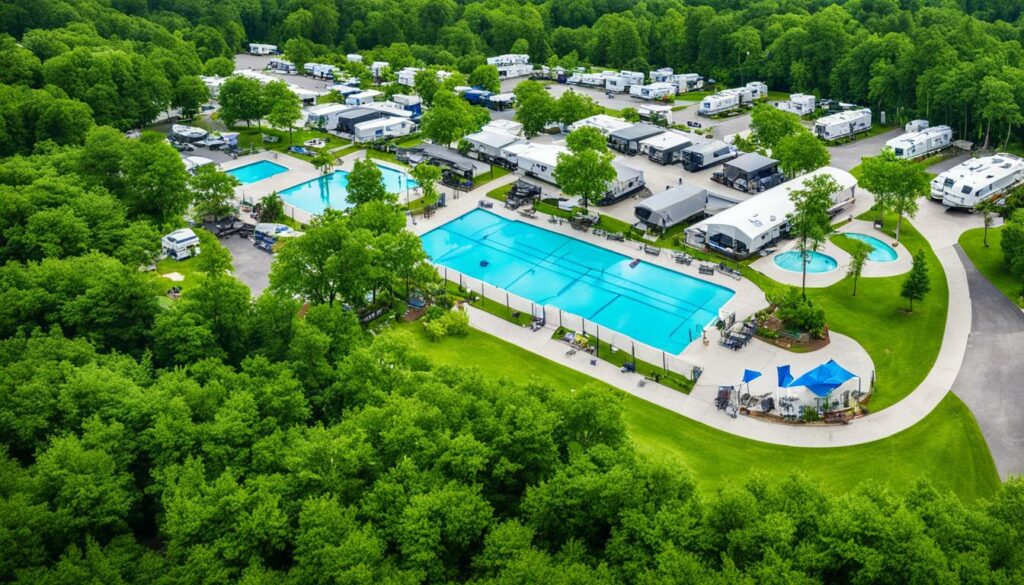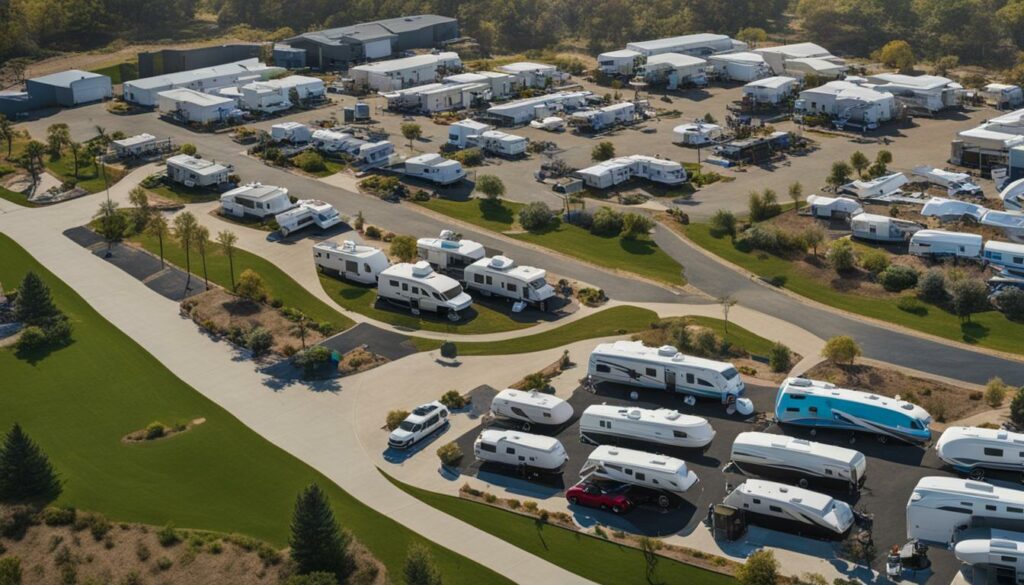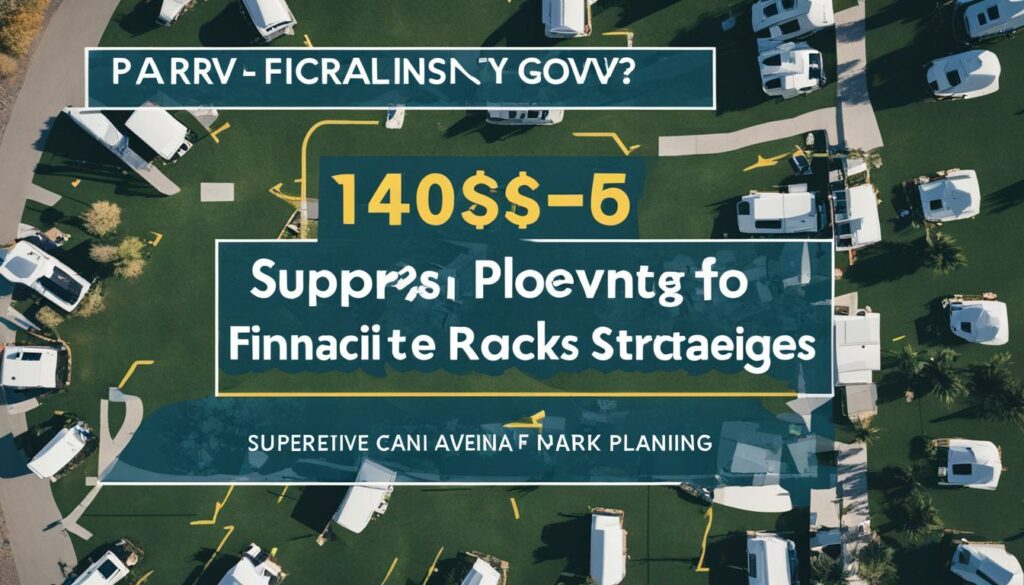RV parks are unique businesses that require careful financial planning and management. To ensure success and profitability, it is crucial to develop effective budgeting strategies that maximize revenue, control costs, and prioritize investments. In this article, you will explore five proven budgeting strategies for RV park owners to implement in their financial planning practices. From analyzing historical data to creating realistic revenue forecasts, controlling operating costs to building emergency funds, these strategies will provide valuable insights and tips for success.
Key Takeaways:
- Developing effective budgeting strategies is crucial for the success and profitability of RV parks.
- Proven budgeting strategies include analyzing historical data, creating realistic revenue forecasts, controlling operating costs, building emergency funds, and engaging professional financial advisors.
- Regular monitoring, adjustment, and adaptation are essential for ensuring the long-term sustainability and success of RV parks.
- Leveraging financial tools and technology can enhance efficiency, accuracy, and overall financial management in your RV park.
- Effective budgeting practices require a comprehensive financial plan that maximizes revenue, controls costs, and prioritizes investments.
Importance of Budgeting in RV Park Management
Efficient financial planning is crucial for any RV park owner who wants to maintain a healthy bottom line and ensure long-term success. This is where budget management comes in. Budgeting allows you to make informed decisions about expenses, revenue, and investments, ultimately leading to efficient financial planning for RV parks. In this section, we’ll explore how RV park budget management can help you maximize your profits and improve your financial health.
The Key Benefits of Budgeting
There are several key benefits of budgeting for RV park management. Firstly, it allows you to plan for the future. By analyzing historical data and predicting future expenses and revenue, you can make informed financial decisions. Secondly, budgeting helps you control your costs. By monitoring your expenses, you can identify areas where you can cut costs and increase profitability. Finally, budgeting helps you prioritize your investments. Instead of spending money on unnecessary expenses, you can direct funds towards areas that will have the greatest impact on your bottom line.
The Role of Budgeting in Financial Planning
Efficient financial planning for RV parks involves setting clear financial objectives. While this may seem overwhelming, budgeting is an essential component of the process. By creating realistic budgets, you can ensure that your financial goals align with your operational capabilities. This will help you to identify potential areas for growth and expansion while avoiding financial pitfalls that could negatively impact your bottom line.
The Continual Improvement Process
RV park budget management is a continual improvement process. To be successful, you must regularly review and adjust your budgets. This allows you to continuously optimize your financial strategies and stay competitive in the industry. By monitoring your revenue performance, controlling your expenses, and making informed financial decisions, you can achieve long-term success in the RV park industry.
Analyzing Historical Data for Accurate Budgeting

Successful budgeting techniques for RV parks require careful analysis of historical data to make informed decisions for future financial planning. It is essential to review past financial information and trends to create realistic budgets for your RV park operations. Through analyzing previous financial reports, you can identify patterns and trends that can provide valuable insights into future expenses and revenues.
It is recommended to start by reviewing the last three years of financial statements and reports. Look for trends in revenue, expenses, and occupancy rates to identify patterns. By identifying patterns, you can make informed projections for future revenues and expenses that form the backbone of your budgeting plan.
Once you have identified trends, you can develop a financial plan that aligns with your RV park’s revenue goals and operational cost structures. Consider the seasonal nature of the RV park and any significant events or changes that could impact revenue. Don’t forget to factor in expenses such as maintenance, repairs, and upgrades to your park facilities.
Over time, it is essential to monitor and adjust your budgets based on actual financial performance. Regularly reviewing and updating your budget can help you stay on track and adapt to changing market conditions. With time and experience, you can refine your budgeting techniques for RV parks and implement strategies that maximize your profitability.
“Analyzing historical data is crucial for any RV park’s financial success. Without comprehensive analysis, it’s nearly impossible to create realistic budgets that align with your park’s financial goals.”
Implementing budget strategies in RV park operations requires effective budgeting practices that are tailored to your unique business needs. Analyzing historical data is an essential component of successful budgeting, providing valuable insights into future expenses and revenues. Using these insights, you can develop financial plans that align with your revenue goals and operational cost structures, maximize your profitability and improve the long-term success of your RV park.
Creating Realistic Revenue Forecasts
Smart financial planning for RV park owners involves creating realistic revenue forecasts that consider various factors. By accurately projecting revenue, you can implement effective budgeting strategies that will help you maximize profits.
When creating revenue forecasts, it’s essential to consider factors such as occupancy rates, average daily rates, and seasonal fluctuations. These factors can significantly impact your revenue, and failing to account for them can lead to inaccurate projections and financial loss.
One effective strategy is to analyze historical data to identify trends and patterns, as well as potential areas for improvement. This data can help you make informed projections for future revenue and expenses, enabling you to allocate resources effectively.
Another strategy is to optimize pricing to enhance revenue. By analyzing market trends and comparing your rates with competitors, you can adjust your pricing to better reflect market conditions and increase occupancy rates.
Ultimately, effective revenue forecasting involves a combination of analysis, strategy, and ongoing monitoring to ensure that your projections remain accurate and up-to-date.
Maximizing Profits through Budgeting in RV Parks:
Maximizing profits through effective budgeting is essential for RV park owners who want to achieve long-term financial success. By creating realistic revenue forecasts, you can implement budgeting strategies that optimize revenue, control costs, and prioritize investments.
Controlling Operating Costs
Effective financial planning for RV parks requires a thorough review of all expenses with an eye toward cost reduction. In this section, we will explore cost-containment strategies to control operating costs in your RV park. By carefully analyzing expenses and exploring opportunities for savings, you can improve financial efficiency and maximize profits. Here are a few cost-effective budgeting tips for RV parks:
- Implement energy-saving measures: One of the most significant expenses for RV parks is energy consumption. By implementing energy-saving measures, such as installing LED lighting or motion sensors, you can reduce energy costs and lower your utility bills.
- Optimize inventory management: Overstocking supplies can lead to unnecessary expenses. By optimizing inventory management and only keeping the necessary amount of supplies, you can save money and reduce waste.
- Maintain equipment and facilities: Regular maintenance and upkeep of your facilities can help prevent costly repairs and replacements. By identifying potential issues early and addressing them promptly, you can reduce operating costs and extend the lifespan of your equipment.
- Negotiate contracts: When dealing with vendors and suppliers, always negotiate contracts and pricing to ensure you’re getting the best deal possible. You may be able to secure discounts or better terms by negotiating effectively.
By implementing these cost-effective budgeting tips for RV parks, you can save money and improve overall financial performance. Remember that operating cost management is an ongoing process that requires regular monitoring and review.
Implementing a Maintenance Budget
One of the most crucial aspects of RV park management is maintaining the park’s facilities and amenities to attract customers and ensure their satisfaction. Without proper upkeep, aesthetics, cleanliness, and functionality can quickly decline, leading to negative reviews, decreased bookings, and lost revenue.
Effective budgeting practices for RV park management involve the creation and implementation of a maintenance budget to allocate funds for regular upkeep, repairs, and upgrades while staying within budgetary constraints. Planning ahead by allocating fixed amounts for regular maintenance tasks is essential to prevent unexpected expenses and to ensure that necessary repairs are done promptly.
Smart financial planning for RV park owners means considering all aspects of your facility that require maintenance in the budget, such as:
- Landscaping and groundskeeping;
- Cleaning and maintenance of common areas like pools, restrooms, and laundry facilities;
- Repair or replacement of equipment like electrical or plumbing systems;
- General maintenance of RV sites, including utility hookups and lighting;
- Upgrades to amenities such as lodges, cabins, and recreational facilities.
It’s important to prioritize tasks based on urgency and the level of impact on the customer’s overall experience. Focus on preventive maintenance over reactive maintenance that could be more expensive.
Implementing a maintenance budget requires careful planning, forecasting future maintenance costs, and setting aside funds accordingly. Nevertheless, it is a vital part of a successful RV park management strategy.
Allocating Budget for Marketing and Advertising

Smart financial planning for RV park owners involves allocating a portion of their budget towards marketing and advertising efforts. Effective marketing campaigns are critical for driving business to your RV park and reaching your target audience. However, it can be challenging to determine the right amount to spend while still staying within budget.
One method for allocating your marketing budget is to base it on a percentage of your overall revenue. The RV park industry standard is between 3% and 5% of revenue, but it’s important to consider your specific goals and circumstances. For example, if you’re launching a new facility or expanding your marketing efforts, you may need to allocate a larger portion of your budget towards advertising.
It’s also crucial to consider which marketing channels will be most effective in reaching your target audience. Social media platforms like Facebook and Instagram can be valuable tools for promoting your RV park and engaging with potential customers. Other options include email marketing, digital advertising, print ads, and direct mail campaigns.
When developing your marketing budget, it’s essential to track your expenses carefully and regularly assess the effectiveness of your campaigns. By analyzing your Return on Investment (ROI) for each marketing channel, you can adjust your budget accordingly and optimize your marketing efforts for better results.
“By allocating resources to marketing and advertising, RV park owners can attract and retain customers while maximizing their profitability.”
It’s worth noting that professional marketing assistance can be invaluable for developing effective campaigns and optimizing your advertising budget. Consider hiring a marketing agency or consultant who can provide expert guidance and create a customized strategy tailored to your specific needs.
Investing in marketing and advertising is a crucial component of smart financial planning for RV park owners. By allocating a portion of your budget towards these efforts, you can attract and retain customers while maximizing your profitability.
Monitoring and Adjusting Budgets
Efficient financial planning and successful budgeting techniques are critical for RV park owners. However, creating a budget plan for your RV park is only the first step towards financial control. Regular monitoring and adjustment are necessary to ensure that your budget remains relevant and effective.
Here are some best practices for monitoring and adjusting your RV park budget:
Track Expenses
Tracking your RV park’s expenses is essential to understanding where your money is going and identifying potential areas for cost savings. Be sure to track all expenses, including maintenance, advertising, staffing, utilities, and other operational costs.
Monitor Revenue Performance
Monitoring revenue performance is critical to understanding your RV park’s financial health. Regularly reviewing revenue data can help you identify trends and areas for improvement. You can use this data to adjust your budget as needed to optimize your revenue potential.
| Key Metrics to Monitor: | Explanation: |
|---|---|
| Occupancy Rates | Occupancy rates indicate how many of your RV park’s sites are currently being utilized. Tracking occupancy rates can help identify the busiest and slowest times of the year. |
| Average Daily Rates | Average daily rates represent the average price per site based on the number of guests per night. Monitoring this metric can help you adjust your pricing to optimize revenue and occupancy. |
| Marketing ROI | Marketing ROI represents the return on investment for your marketing efforts. Measuring ROI can help you identify which marketing strategies are most effective and allocate your resources accordingly. |
Make Necessary Adjustments
Effective budgeting requires flexibility and adaptability. Monitor your budget regularly and make necessary adjustments based on changes in market conditions, revenue performance, or unexpected expenses.
Remember that budgeting is an ongoing process that requires attention and effort. By regularly monitoring and adjusting your RV park’s budget, you can ensure financial control and long-term success.
Building Emergency Funds and Reserves

In the unpredictable world of RV park management, emergencies can happen at any time. From sudden repairs to unexpected drops in occupancy rates, these unforeseen events can significantly impact your bottom line. That’s why it’s crucial to have a plan in place for building emergency funds and reserves as part of your budgeting strategy, ensuring the stability and resilience of your park.
Implementing budget strategies in RV park operations involves planning for the unexpected. By setting aside funds for emergencies, you can weather unexpected events while minimizing their impact on your overall finances. But how much should you allocate to your emergency fund? Experts recommend that RV park owners set aside at least 3-6 months of operating expenses.
[Emergency fund table here, displaying budget allocation and expense examples]
Of course, the amount you choose to allocate depends on your specific circumstances, including the size and scope of your RV park, its location, and the potential risks and challenges you may face. Consider the historical data and any trends that could impact your RV park’s operations, and adjust your budget accordingly.
“Having an emergency fund is like insurance—it provides peace of mind and protects you from the unexpected.”
When it comes to building emergency funds and reserves, keep in mind that this is an ongoing process—not a one-time expense. Adjust your budget as needed and make emergency fund contributions a regular part of your financial planning. This way, you’ll be better prepared for any challenges that come your way, ensuring a stable and profitable future for your RV park.
Engaging Professional Financial Advisors
RV park budget management can be complex and challenging, especially for owners who lack financial expertise. That’s where professional financial advisors come in. They have the skills and knowledge to help you develop successful budgeting techniques for RV parks and optimize your financial planning.
Collaborating with experienced financial advisors has several benefits. They can:
- Provide valuable insights: Financial advisors can help you identify areas of improvement in your budget management and offer advice on effective financial strategies tailored to your specific needs.
- Offer guidance on investment: Advisors can assess the feasibility of proposed investments and help you evaluate potential returns on investment.
- Reduce risk: Advisors can perform risk assessments and recommend risk management strategies to protect your RV park’s financial stability.
When selecting a financial advisor, it’s essential to find someone who is reputable and has experience working with businesses in the RV park industry. Look for advisors who have:
- Expertise: Choose advisors who have experience in financial planning for RV parks and understand the unique challenges and opportunities of the industry.
- Credentials: Look for advisors who are certified financial planners, licensed investment advisors, or hold a similar professional designation.
- A transparent fee structure: Don’t be afraid to ask about fees and how the advisor charges for their services. Make sure you understand the costs upfront.
By engaging professional financial advisors, RV park owners can benefit from expert advice and guidance on budgeting strategies that can maximize profits and ensure long-term success.
Leveraging Financial Tools and Technology

Efficient financial planning is key to maximizing profits through budgeting in RV parks. In this section, we will explore how to leverage financial tools and technology to optimize your budgeting process and improve overall financial management. By embracing digital solutions and software, you can streamline operations, improve accuracy, and ultimately save time and money.
Budgeting Software
One of the most popular financial tools for RV park owners is budgeting software. There are several software options available, each with unique features and benefits. For example, some software can automatically sync data from your bank accounts and generate customized reports, while others provide more granular budget tracking or forecasting capabilities. Consider your specific needs and budget when selecting a software solution.
Digital Expense Tracking
Digital expense tracking is another essential tool for RV park budgeting. By digitizing expense tracking, you can easily monitor expenses, identify patterns, and make informed decisions about future spending. Popular expense tracking apps and tools include Expensify, QuickBooks, and FreshBooks.
Online Payment Systems
Online payment systems can also help improve financial management in your RV park. By providing convenient payment options for guests and tenants, you can increase revenue and reduce late payments. Popular online payment options for RV parks include PayPal, Square, and Stripe.
Electronic Contracts and Agreements
Electronic contracts and agreements can also help streamline operations and improve budgeting accuracy. By digitizing contracts and agreements, you can reduce paper waste and save time on administrative tasks. Popular electronic signature software includes DocuSign, Adobe Sign, and HelloSign.
Conclusion
In conclusion, effective budgeting strategies are vital for the success and profitability of RV parks. By following the five proven strategies outlined in this article, RV park owners can develop a comprehensive financial plan that maximizes revenue, controls costs, and prioritizes investments. Budgeting is an ongoing process that requires regular monitoring, adjustment, and adaptation to ensure long-term sustainability and success in the RV park industry.
RV park owners should remember the importance of efficient financial planning, accurate data analysis, and realistic revenue forecasting. They should also consider cost-containment strategies, implementing a maintenance budget, allocating budget for marketing and advertising, building emergency funds and reserves, and leveraging financial tools and technology to optimize their budgeting process.
It is recommended to engage professional financial advisors to assist with budgeting in the RV park industry. Experienced advisors can provide valuable insights, help identify areas of improvement, and offer guidance on financial strategies tailored to specific needs. Lastly, RV park owners should remember that budgeting is a continuous process that requires dedication, discipline, and attention to detail for long-term success.
FAQ
What are some effective budgeting strategies for RV park success?
Some effective budgeting strategies for RV park success include analyzing historical data, creating realistic revenue forecasts, controlling operating costs, implementing a maintenance budget, allocating budget for marketing and advertising, monitoring and adjusting budgets, building emergency funds and reserves, engaging professional financial advisors, and leveraging financial tools and technology.
Why is budgeting important in RV park management?
Budgeting is important in RV park management because it allows owners to maintain a healthy bottom line, make informed decisions about expenses and revenue, and ensure long-term success. It helps owners maximize efficiency and profitability, while also providing a clear financial roadmap for effective decision-making.
How can historical data analysis contribute to accurate budgeting?
Historical data analysis can contribute to accurate budgeting by allowing RV park owners to identify patterns and trends in their financial information. By reviewing past data, owners can make informed projections for future expenses and revenues, enabling them to create budgets that align with their park’s specific needs and goals.
What factors should be considered when creating revenue forecasts for an RV park?
When creating revenue forecasts for an RV park, factors such as occupancy rates, average daily rates, and seasonal fluctuations should be considered. By analyzing these factors, owners can make accurate projections and optimize revenue generation, ultimately maximizing profitability and success.
How can RV park owners control operating costs?
RV park owners can control operating costs by carefully analyzing expenses and exploring opportunities for savings. This may involve negotiating better deals with suppliers, implementing energy-saving measures, optimizing staff scheduling, and seeking cost-effective maintenance and repair solutions. By reducing expenses without compromising quality, owners can improve financial efficiency and increase profits.
Why is implementing a maintenance budget important in RV park management?
Implementing a maintenance budget is important in RV park management because it ensures proper upkeep of facilities and amenities. By allocating funds for regular maintenance, repairs, and upgrades, owners can provide a high-quality experience for guests, attracting and retaining customers while also ensuring the long-term sustainability and value of the park.
How should RV park owners allocate a budget for marketing and advertising?
RV park owners should allocate a budget for marketing and advertising by considering their target audience, marketing goals, and available resources. By implementing targeted marketing campaigns, utilizing digital platforms, and partnering with local tourism organizations, owners can effectively promote their RV park and attract guests, ultimately maximizing revenue and occupancy rates.
What are some best practices for monitoring and adjusting budgets in RV park management?
Some best practices for monitoring and adjusting budgets in RV park management include tracking expenses regularly, analyzing revenue performance, conducting periodic budget reviews, and making necessary adjustments based on market conditions and financial goals. By staying proactive and adaptable, owners can optimize their budgeting strategies and ensure financial control.
Why is building emergency funds and reserves important for RV park owners?
Building emergency funds and reserves is important for RV park owners because it provides a safety net for unexpected expenses or economic downturns. By setting aside funds specifically for emergencies, unforeseen repairs, or periods of low occupancy, owners can ensure the stability and resilience of their park, mitigating potential financial hardships and maintaining operations.
How can professional financial advisors assist RV park owners in budgeting?
Professional financial advisors can assist RV park owners in budgeting by providing valuable insights, identifying areas of improvement, and offering guidance on financial strategies tailored to the specific needs of the park. Their expertise can help optimize budgeting practices, improve financial efficiency, and enhance overall success in the RV park industry.
What financial tools and technology can RV park owners leverage to optimize budgeting?
RV park owners can leverage financial tools and technology such as budgeting software, digital expense tracking platforms, and online banking solutions to streamline and optimize their budgeting process. By utilizing these tools, owners can enhance efficiency, accuracy, and overall financial management, ultimately maximizing profits and success in the RV park industry.





